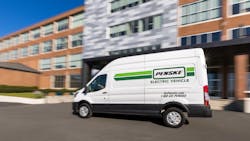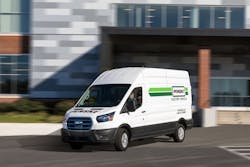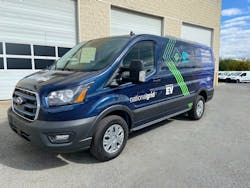Ford E-Transit gets to work with pilot program fleets
Ford Motor Co. continues to work ahead of the curve in the transition to electric vehicles for the commercial market, delivering preproduction units of its 2022 E-Transit van to fleets for evaluation. The new electric version of America’s best-selling van comes equipped with a comprehensive suite of Ford Pro services designed for commercial customers, and the aim of the pilot program is to fully field test the complete package for the wide variety of commercial applications and demands.
Operating in fleets that span industries such as rental, delivery, service, maintenance, telecom, and utilities, these E-Transit pilot vans will give companies the opportunity to experience how battery-powered vehicles coupled with Ford Pro Intelligence and Ford Pro Charging solutions can help improve fleet efficiencies.
“Our customers are telling us that they have ambitious sustainability goals to reduce their fleets’ carbon emissions through the integration of all-electric vehicles,” said Ford Pro CEO Ted Cannis. “E-Transit commercial vans and the supporting Ford Pro ecosystem, especially end-to-end charging, play a critical role in helping achieve those goals and transforming their business operations without disruption.”
Penske Truck Leasing plans to evaluate and validate the E-Transit van's capabilities, driving experience, and charging strategy for specific applications, including rentals to small- and medium-size commercial businesses.
As part of the pilot program, Penske has deployed an E-Transit van in the Reading, Pennsylvania, area. Penske’s long-term electric vehicle plans include adding electric vans throughout its wider network, including Southern California.
“We’re excited to collaborate with Ford Pro on the introduction and real-world testing of these new electric vehicles as the first truck rental and leasing company to do so,” said Art Vallely, president, Penske Truck Leasing. “We expect to see strong utilization and interest from customers making final-mile deliveries, regional deliveries, and eventually consumer use for smaller household moves.”
E-Transit, billed as the first all-electric cargo van from a full-line automaker in North America, is assembled alongside Transit at Ford’s Kansas City Assembly Plant. The E-Transit van is designed to serve a wide range of commercial industries, providing customers a choice of eight configurations, including a cargo van with three roof heights and three lengths, plus chassis cab and cutaway versions.
Participating companies will deploy vehicles in specific applications to evaluate performance, identify the best route types, and explore charging solutions while connected to the Ford Pro ecosystem.
Included technologies
Ford Pro Intelligence delivers technology solutions that connect to the vehicle, such as Ford Pro E-Telematics software tools. The technology connects wirelessly—helping businesses manage fleets with real-time vehicle insights such as charge event monitoring, vehicle tracking, state of charge, range, charge history and logs, charging/battery settings and alerts, and departure preconditioning to help maximize range and save battery life for the road.
Ford Pro Charging is designed to provide end-to-end tools to enable home, public, and depot charging tailored to fleet operational needs. Employee home charging will include available hardware and software solutions to manage overnight charging along with access to energy reports to make driver reimbursement simple. When public charging is needed, customers can access the BlueOval Charge Network—America’s largest public charging network that offers more than 19,500 charge stations and 63,000 charging plugs nationwide, according to Ford. Depot charging solutions include hardware and software that monitor optimal charging times for fleets to help avoid costs associated with peak charging hours.
National Grid, a global energy management company and operator of several utility conglomerates, recently took delivery of a preproduction low-roof E-Transit that it will test on regular home meter-reading routes to ensure it can perform the same operations now performed by the company’s gas-powered vehicles.
“We are proud to be the first energy company in the Northeast to test out Ford’s electric van and collaborate with Ford Pro,” said Badar Khan, president of National Grid, U.S. “Over the next decade, National Grid will be moving to a 100% electric fleet for our light-duty vehicles and working to replace medium- and heavy-duty vehicles with sustainable options. Last year, we began testing electric backhoes and this year, e-vans could bring us closer to our goal of net zero emissions by 2050.”
Ford Pro will use feedback and data from the pilot program to validate real-world vehicle performance across a broad range of use cases, upfits, temperatures and driving environments to continue to refine products and develop additional training tools.
“Beyond supplying all-electric vehicles to customers, Ford Pro is helping businesses determine better solutions for energy management and fleet efficiency,” said Cannis. “Our services link to the vehicle and into the entire operational environment of the business, which is the only way EVs will stick. Anything else is just disruptive to their business bottom line.”
E-Transit will begin arriving at dealerships early next year.
About the Author
FleetOwner Staff
Our Editorial Team
Kevin Jones, Editorial Director, Commercial Vehicle Group
Josh Fisher, Editor-in-Chief
Jade Brasher, Senior Editor
Jeremy Wolfe, Editor
Jenna Hume, Digital Editor
Eric Van Egeren, Art Director


